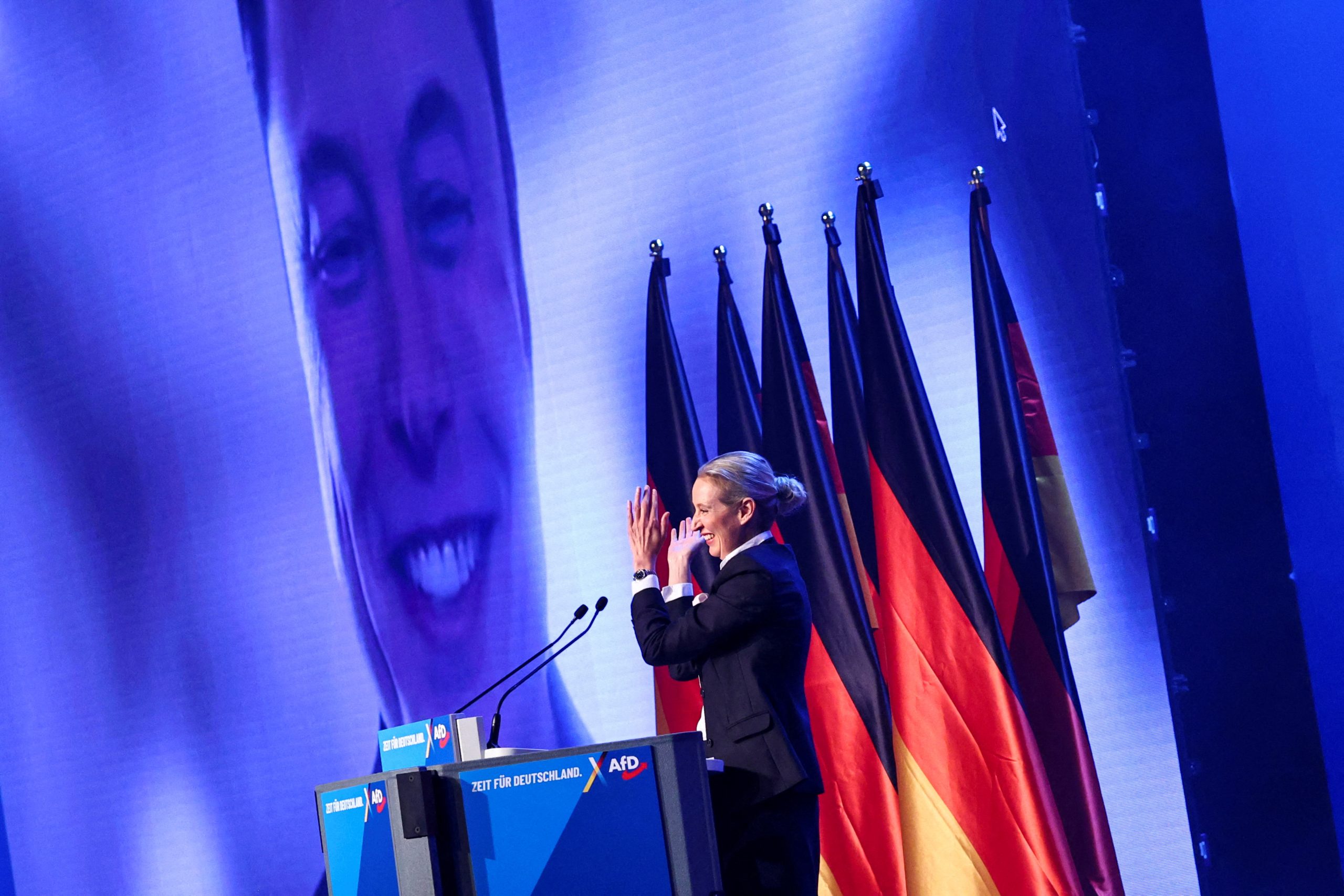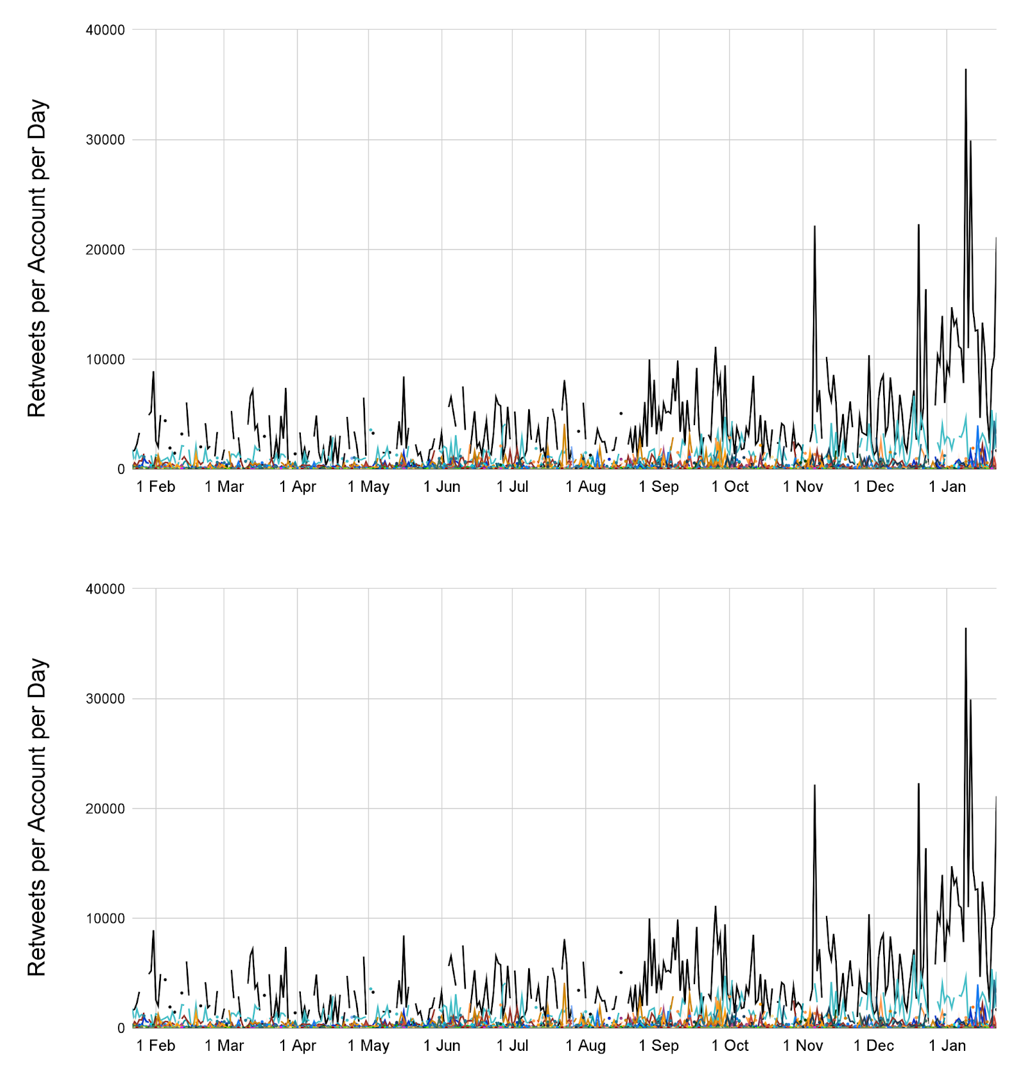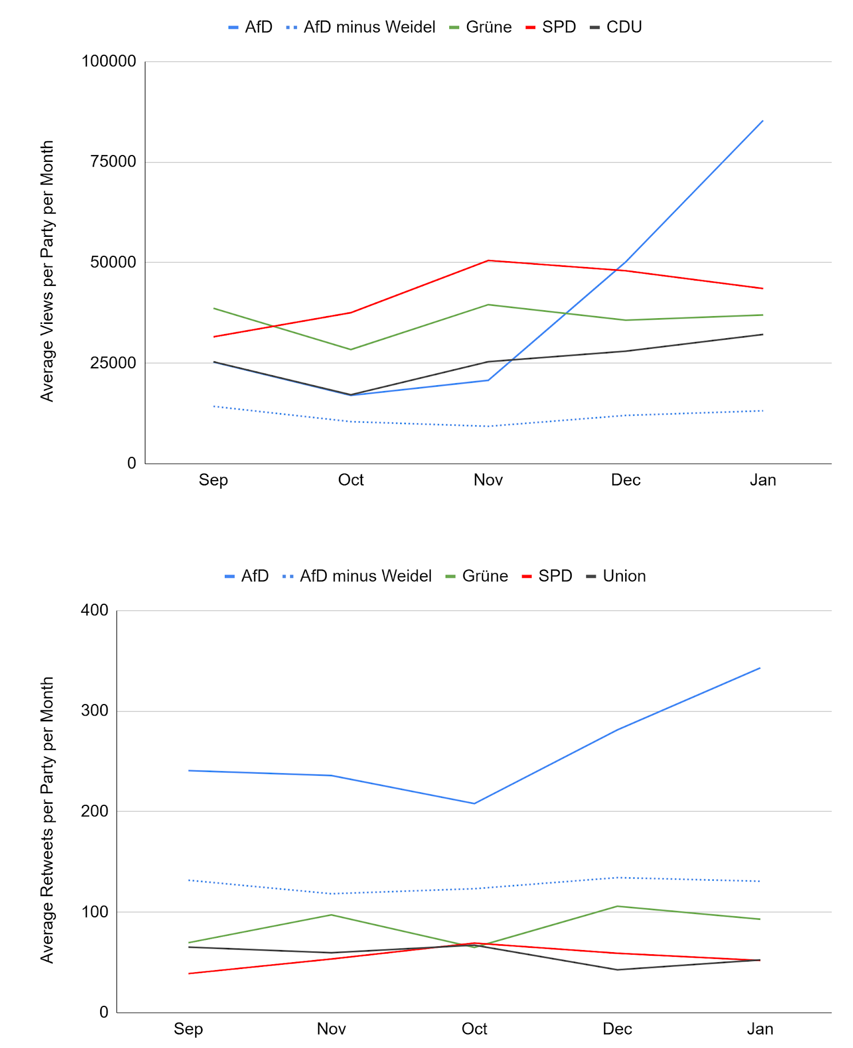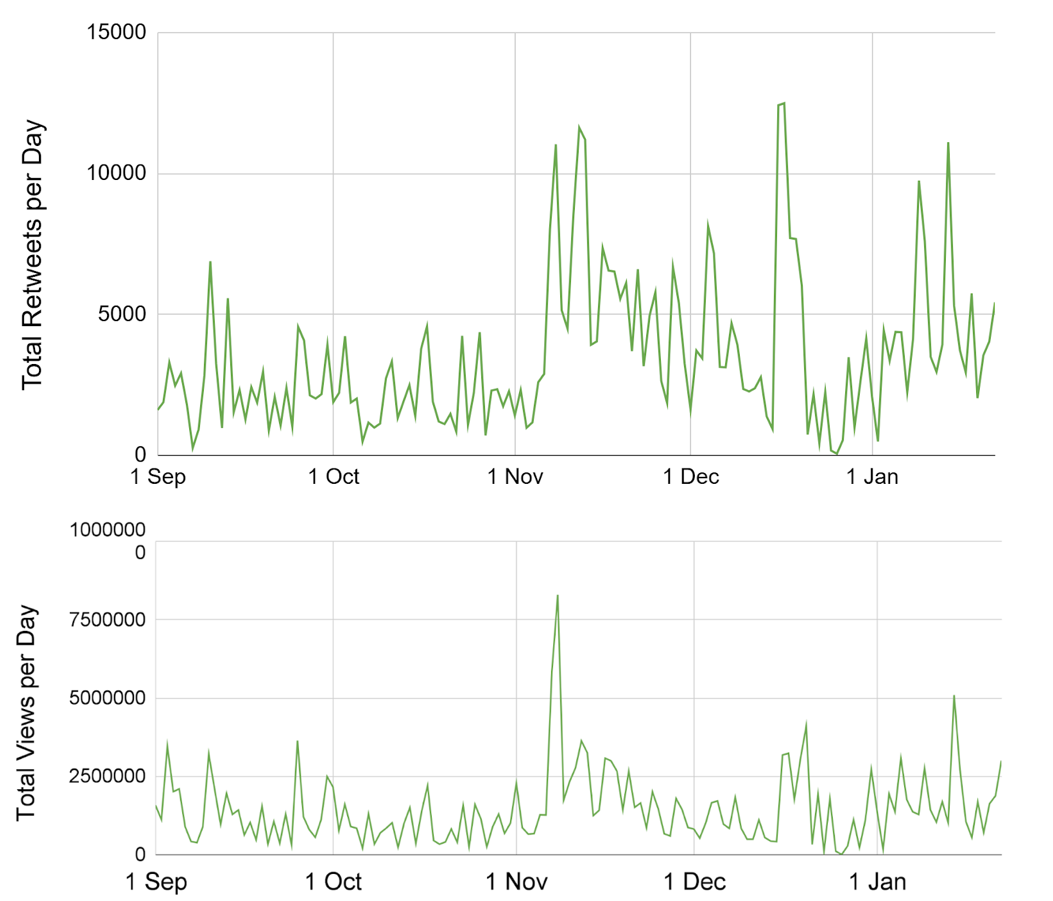The Musk Effect: Assessing X’s impact on Germany’s election discourse
Weidel-Musk interactions drove a significant portion of AfD’s X engagement, with data showing a high volume of English-language accounts contributing to the party’s increased reach on the platform
The Musk Effect: Assessing X’s impact on Germany’s election discourse
Share this story

BANNER: AfD party leader Alice Weidel gestures as Elon Musk appears on the screen during a central election campaign event of the AfD in Halle, Germany on January 25, 2025. (Source: Karina Hessland via Reuters)
Findings
- The far-right AfD outperform other German parties on X. Most of this engagement from social media users is driven by Alice Weidel, the party’s leader, and her online interactions with Elon Musk. That has allowed the AfD to gain increased engagement on X largely from English-language accounts.
- The Atlantic Council’s Digital Forensic Research Lab (DFRLab) and AlgorithmWatch see no evidence of either increased social media engagement of the AfD beyond the “Musk bump” to Alice Weidel, nor systematic suppression of anti-AfD accounts by X’s recommender systems. In one instance, however, a particularly popular anti-Musk post was hidden in a way that was not consistent with how other similar content was treated and does not seem to have been visible to the post’s authors. This made it hard for the group to appeal, in a way which may run contrary to the European Union’s Digital Services Act.
- The analysis does not point to X posing systemic risks to the German election in a manner that the European Commission would need to enforce under the bloc’s Digital Services Act. Based on the researchers’ analysis, Musk’s promotion of AfD politicians — and, predominantly, its leader Alice Weidel — should be viewed primarily as Musk using his own personal influence and followers to boost the AfD, rather than as a more systematic manipulation of the underlying X platform and its algorithms in favor of a specific German political party.
Germany holds federal elections on February 23, 2025, amid sluggish domestic economic growth and political paralysis that has seen nationalist and populist parties gain ground nationwide. Into that complex situation has stepped Elon Musk, the world’s richest man, a senior adviser to US president Donald Trump and owner of X, the social media network formerly known as Twitter.
In December, Musk publicly supported Alternative for Deutschland (AfD), a far-right political party that opposes immigration into Germany, is skeptical of the West’s support of Ukraine in its ongoing fight against Russia, and some of whose candidates and associated groups have been classified as far-right extremists by German authorities. They have recorded growing popularity and electoral success, particularly in the Eastern part of Europe’s largest economy.
The AfD is currently sitting second in polling, on an estimated 21 percent of the national vote, behind the Christian Democratic Union (CDU), a center-right political party. Friedrich Merz, the CDU leader, is expected to become Germany’s next chancellor. A coalition government is almost certain to be the outcome of the February 23 election, and will involve potentially months of political uncertainty until such an agreement can be reached between the country’s lawmakers.
The DFRLab and AlgorithmWatch conducted a data analysis to quantify the impact, if any, of Musk’s public support of Germany’s AfD on X. The social network does not have a high number of users in the European country. But, like elsewhere globally, despite some accounts choosing to leave the platform, the Musk-owned platform remains home to many of Germany’s leading politicians, social media influencers and traditional media that set the tone during the federal election campaign period which began in November.
The goal of the research was to quantify whether Musk had artificially promoted the AfD on X to boost its popularity ahead of this month’s vote.
The DFRLab and AlgorithmWatch did not make judgments about what the AfD, other German political parties or Musk posted on X. The research, based on publicly available data provided by the social network, focused solely on how Musk — a Trump adviser whose separate business interests include control over one of the world’s major global online platforms — may have influenced another country’s electoral process via the promotion of a domestic political party through his social network.
DFRLab and AlgorithmWatch researchers collected thousands of data points on the X posts from all known German politicians, divided by party affiliation, over the last 12 months. That included social media engagement, specifically each post’s likes, shares, comments, and views. They then analyzed whether Musk’s public support for the AfD — particularly from December 2024 onwards when he publicly backed the political group — had correlated with increased engagement figures for the German far-right party, or other social media patterns that were not in line with the organization’s previous interactions with users on X.
These social media engagement metrics were used as a proxy to quantify whether AfD politicians’ posts on X had received greater visibility on the platform, based on overall interactions with X users and compared to other parties and selected anti-AfD organizations, after Musk’s public support in ways that may be attributable to potential changes to the social network’s content algorithms. These mostly opaque internal systems determine what content is displayed in people’s feeds on X.
It should be noted that focusing on German politicians’ posts is only part of a wider political ecosystem on X. There may be relevant content produced by non-politicians’ accounts which is boosted either by more subtle “grassroots” operations and/or X’s algorithms — topics that were not part of the researchers’ analysis. During Germany’s election period, however, it would be expected that any changes in how these non-politician X accounts were amplified, or not, on X would also be reflected in the engagement figures associated with prominent politicians’ accounts on the platform.
The ‘Musk bump’
On December 20, 2024, Musk posted to his more than 210 million followers on X that “only the AfD can save Germany.” A week later, he wrote an article for one of the country’s leading newspapers that claimed the AfD was not an extremist organization and that the group was “the last spark of hope for Germany.”
On January 9, 2025, Musk held a live-stream conversation on X with AfD leader Alice Weidel. Later that month, the American billionaire — who is advising the Trump administration and its unofficial US Department of Government Efficiency (DOGE) — made a surprise virtual appearance at a 4,500-person AfD rally in Eastern Germany where he told them “fight for a great future for Germany.”
Elon Musk’s public backing of the AfD led to significant increases in overall engagements for the German far-right political group on the social network. In the week in December before the American billionaire backed the political party, for instance, the collective views for all posts from AfD politicians was just over 17,000, based on the DFRLab and AlgorithmWatch’s analysis of X’s public data. Yet the week after Musk rallied behind the organization, those figures increased more than 8-fold, to a collective 145,000 views. Over that time period (the week of December 9 and December 23, respectively), the number of overall weekly AfD posts fell by more than 40 percent — meaning the organization received significantly more engagement, per post, after the tech executive-turned-US government adviser promoted them on his social network.
Engagement focused on Alice Weidel and Musk
Almost all of the AfD’s increased engagement came through the account of party leader Alice Weidel. She has just under one million followers on X — a figure that has almost doubled since late December. Weidel is by far the most engaged-with AfD, and German, politician on the social network. Her interactions with, and her reposting by, Musk has driven the lion’s share of her organization’s increased interactions and views on the platform during the German election campaign. Her popularity has not translated into similar social media engagement increases for the AfD and its other politicians, more widely.

Weidel has 13 of the top 50 most-viewed X posts by German politicians over the 12-month research period, based on the DFRLab and AlgorithmWatch’s analysis of the social media company’s public data. That includes the six most-viewed posts since December, all of which made reference to Musk. Four of the six were in English.

On December 28, Weidel posted a message on X that promoted Musk’s German newspaper article that had praised the AfD’s policies. It received more than 15 million views and included the billionaire’s X handle in the post. “Only 5 days to go: On January 9th at 1 pm EST, the announced Space with Elon Musk and me will go live on X,” Weidel subsequently wrote on January 4 in a message that received more than 24 million views — the most for any German politician’s post on X during the campaign period.
By comparison, the most-viewed X post from Friedrich Merz, the presumptive next German chancellor, over the same time period only garnered 2.2 million views. The CDU leader’s message criticized the country’s current coalition government and its “manipulation of voting rights” in relation to proposed changes to national voting districts.
As seen below, Weidel’s Musk-related posts and interactions on X substantially boosted views of her content compared to other German politicians. When she is removed from the dataset, however, the dominance of the AfD on X quickly disappears. These patterns hold for other engagement metrics, including when normalized for the number of posts per party. This finding correlates with other research conducted by Sami Nenno and Philipp Lorenz-Spreen.

Increased engagement from outside Germany
Weidel’s growing interaction with Elon Musk from December onwards went hand-in-hand with the AfD’s increased engagement with accounts outside of Germany.
The DFRLab and AlgorithmWatch took a subset of the top 20 most viewed posts for the country’s leading political parties, including the AfD, CDU and its sister group, the Christian Social Union (CSU), which are highly likely to be the leading party after this election, and the Social Democratic Party (SPD), which are currently the leading party in the current coalition government. The researchers then created a dataset of X accounts that had shared those messages at least twice — a proxy for repeated engagement with each political party. Those interactions were then divided into a pre-campaign period (August 1 to October 31) and a campaign period (November 1 to February 7). They were also grouped into different languages of each X user to distinguish German-language engagement with social media interactions based in other languages.
The chart below demonstrates a significant language shift for the AfD in which X users shared their posts before and after Musk’s public support and own reposting of the group’s content. In the pre-campaign period, 80 percent of the AfD’s sharing came from German-language accounts and only 8 percent of reposting resulted from English-language X users. After Musk’s involvement, however, that dynamic switched so that, during the campaign period, English-language accounts accounted for almost 40 percent of the shares on the AfD posts compared to just under 20 percent of reposts coming from German-language users.
X’s public data makes it impossible to quantify where these English-language accounts were based. But the DFRLab and AlgoritmWatch’s qualitative analysis of these reposts — many of which resulted from Musk’s own interactions with the AfD — demonstrated a significant proportion of engagement by X accounts associated with the Make America Great Again (MAGA) movement in the US.
By comparison, no other German political party saw any significant change in language profile for how their X posts were shared by the most-engaged users. Both the CDU/CSU and SPD still reached a predominantly German-language audience — of likely German citizens able to vote in the February 23 election — in both the pre-campaign and campaign periods.
The most likely explanation for this change in the AfD’s language-specific audience, over the two time periods, is the involvement of Musk in amplifying the group’s message to his global following. Separate research conducted by the Center for AI & Digital Humanism, a think tank, suggested the most common words in biographies of accounts engaging with AfD-related content were MAGA, Trump, Life, Crypto, and God. That analysis also suggested a strong lean towards Republican Americans rather than Germans in who was engaging with the political party’s content on X.
Investigating suppression of anti-AfD content
As well as pro-AfD content, the researchers also investigated whether X may have suppressed anti-AfD content. To quantify that potential impact, the DFRLab and AlgorithmWatch also analyzed posts from politicians opposed to the AfD, in addition to posts from anti-AfD accounts on X. They analyzed the last 12 months of their interactions and posts on the social network, based on publicly available data provided by the company.
The researchers did not see any clear decrease in non-AfD politicians’ engagement figures after Musk began to support the AfD in December. The charts below focus on posts by politicians from the Green party, which has one of most antagonistic relationships to the AfD among Germany’s political parties.

Beyond the political parties, the researchers also analyzed posts from 65 X accounts associated with organizations signed up for the “AfD-Verbot” (“ban the AfD”) campaign.
Within these posts, one vastly outperformed in terms of engagements. As with many of the top performing pro-AfD posts, the social media message was in English; it was about Elon Musk; and it was posted during the campaign period on January 22. It was from the political activist group Zentrum für Politische Schönheit (Centre for Political Beauty).
The post features a photo of the group’s projection onto the side of the Tesla factory outside Berlin, which depicted Elon Musk making a now-famous gesture which has been compared to a Nazi salute, under the slogan “Heil Tesla.” It has received around 5,000 retweets and 1.4 million views. The projection was also widely reported on domestically and internationally.

X users attempting to view the post in Germany were unable to view it, and instead saw a label that read, “This Post from @politicalbeauty has been withheld in Germany based on local law(s).”
The DFRLab and AlgorithmWatch tested the ability to view the post from multiple computers and user accounts — with and without so-called virtual private networks, which allow a user to seem as if they are in a different country — and received the same result whenever the browser location was set to Germany.
Under the EU’s Digital Services Act, users can report posts that violate national laws in Europe. It is possible that someone reported this post; that X judged the image to violate German laws against Nazi imagery; and that it was taken down accordingly.

Numerous other posts on X — which did not receive such large engagement figures — also depict the exact same image but had not been taken down. As a test, the researchers reported one of these separate posts as illegal content, using the Digital Services Act reporting mechanism on X, and were told it was not illegal. That runs in contradiction to what was stated about the high-performing post that was made inaccessible in Germany.
When the DFRLab and AlgorithmWatch contacted the Zentrum für Politische Schönheit, the author of the post, they told the researchers they could still see the social media message from a browser located in Germany. The group had not received a notification that their post was removed, although the EU’s Digital Services Act states, under Article 16, that a platform must “notify that individual or entity of its decision in respect of the information to which the notice [that their content is being taken down] relates, providing information on the possibilities for redress in respect of that decision.” The Zentrum für Politische Schönheit received such notifications in the past for other posts, but not on this occasion.
The DFRLab and AlgorithmWatch could not ascertain why the popular post had been removed, but the organization behind the message had not been contacted. By not being made aware that the post was inaccessible to others the organization was unaware, before being contacted by the researchers, that the post criticizing Musk had been scrubbed from X in Germany.
X did not respond to the DFRLab and AlgorithmWatch’s questions about the Zentrum für Politische Schönheit’s post.
Conclusion
Musk’s amplification of AfD posts to a large English-language audience has brought the German far-right group to the attention of many in the United States where the tech billionaire is now a close ally to president Trump.
That includes showcasing the German group as a potential aligned member of the MAGA movement whose policies mirror some of those supported by the current White House administration. On February 14, US Vice President JD Vance spent time with Alice Weidel, the AfD leader, in Munich, but did not meet Olaf Scholz, Germany’s current chancellor.
It remains unclear how such promotion within an English-language audience — fueled by Musk’s global audience — will translate into potential AfD’s electoral success on February 23.
Overall, the researchers do not see evidence of a systematic boosting of AfD politicians’ content, beyond largely English-language engagement gained through Musk’s retweets of Alice Weidel’s account. Although the EU’s Digital Services Act is currently unclear on what constitutes a “systemic risk to electoral processes,” (per Article 34), it appears unlikely the phenomena we observed in this research should be viewed as a severe threat to the integrity of upcoming German elections.
The treatment of the Zentrum für Politische Schönheit’s post, as described above, may represent a violation of the Digital Services Act, though, under rules relating to transparent and consistent content moderation rather than systemic risks to elections. In addition to the legality, the unusual treatment of a post critical of X’s owner — where they were not notified that the group’s post had been made unavailable within Germany — raises questions about impartiality and freedom of speech on the platform, in line with other past criticisms of Musk.
The outsized attention taken by the personality and interests of Elon Musk linked to the AfD’s engagements on X, especially within the platform’s English-language user base, highlights how the activity of the social network, formerly known as Twitter, is strongly swayed by the personal, political, and economic interests of its owner. It is challenging to fully analyze any social media company’s opaque algorithms, and provisions within the Digital Services Act could provide better access to relevant data.
Based on the researchers’ analysis, however, Musk’s promotion of AfD politicians — and, predominantly, its leader Alice Weidel — should be viewed primarily as Musk using his own personal influence and followership to boost the AfD, rather than as a more systematic manipulation of the underlying X platform and its algorithms in favor of a specific German political party.
Cite this case study:
Mark Scott and Oliver Marsh, “The Musk Effect: Assessing X’s impact on Germany’s election discourse,” Digital Forensic Research Lab (DFRLab) and AlgorithmWatch, February 20, 2025, https://dfrlab.org/2025/02/20/the-musk-effect-xs-impact-on-germanys-election.

